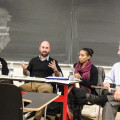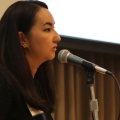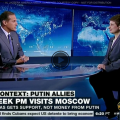 International Affairs Professor, Nina Khrushcheva, claims in an article entitled Building Berlin’s Wall helped avoid a nuclear confrontation that “[t]hough the physical Berlin Wall was torn down 25 years ago, the psychological wall remains intact. Stronger than ever.” Nina asserts that the Berlin Wall was in fact put up not as an aggressive action seeking to control and divide the masses, but as a way to avoid nuclear confrontation. Soviet Premier Nikita S. Khrushchev, Nina’s great grandfather, was (unofficially) concerned with the possibility that the German region closest to the Soviet Union could posses nuclear weapons. The wall, in some ways, was an unfortunate alternative to a potentially more violent and costly outcome of the USSR taking the entirety of Germany.
International Affairs Professor, Nina Khrushcheva, claims in an article entitled Building Berlin’s Wall helped avoid a nuclear confrontation that “[t]hough the physical Berlin Wall was torn down 25 years ago, the psychological wall remains intact. Stronger than ever.” Nina asserts that the Berlin Wall was in fact put up not as an aggressive action seeking to control and divide the masses, but as a way to avoid nuclear confrontation. Soviet Premier Nikita S. Khrushchev, Nina’s great grandfather, was (unofficially) concerned with the possibility that the German region closest to the Soviet Union could posses nuclear weapons. The wall, in some ways, was an unfortunate alternative to a potentially more violent and costly outcome of the USSR taking the entirety of Germany.
This was all during a time when the US was indeed acting in an aggressive and hostile manner toward the Soviet Union and yet, according to Professor Khrushcheva, their was a willingness to explore diplomatic solutions to hostilities between the two world powers during the Cold War. A quarter century later, Putin insists that the US is acting aggressively in the region and is thus responsible for tension between Russia and NATO for its “unwelcomed expansion”.
Nina also appeared on “The Last Word with Lawrence O’donnel” and “The Reid Report” last week to talk about recent moves by Putin that demonstrate the symbolic tactics being used to show defiance toward the West. Nina proposes that Putin, feeling the growing presence of NATO, and a refusal of the West to recognize Russia’s sphere of influence, is more than willing to invest in expensive propaganda, in the form of flying bombers over the Caribbean, just 50 miles from U.S. territory. Putin seems eager to keep old tensions alive, likely in response to sanctions imposed on Russia by the U.S.




